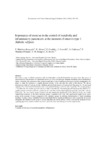Importance of exercise in the control of metabolic and inflammatory parameters at the moment of onset in type 1 diabetic subjects

Ver/
Use este enlace para citar
http://hdl.handle.net/2183/21884Coleccións
- Investigación (FCS) [1293]
Metadatos
Mostrar o rexistro completo do ítemTítulo
Importance of exercise in the control of metabolic and inflammatory parameters at the moment of onset in type 1 diabetic subjectsAutor(es)
Data
2014-05-05Cita bibliográfica
Martínez-Ramonde T, Alonso N, Cordido F, Cervelló E, Cañizares A, Martínez-Peinado P, Sempere JM, Roche E. Importance of exercise in the control of metabolic and inflammatory parameters at the moment of onset in type 1 diabetic subjects. Exp Clin Endocrinol Diabetes. 2014 Jun;122(6):334-40.
Resumo
[Abstract] The onset of type 1 diabetes coincides with the final phase of β-cell destruction. In some cases, this period is characterized by the presence of a functional reserve of β-cells, favouring an adequate metabolic control (honeymoon phase). Therefore, the extension of this situation could have evident benefits in subsequent diabetes management. We aimed to study the influence of regular physical activity before and after the onset of the disease. We did an observational study of 2 groups of type 1 diabetic patients from onset to a 2-year period. One group (n=8) exercised regularly (5 or more hours/week) before onset and continued doing so with the same regularity. The second group (n=11) either did not perform physical activity or did so sporadically. Circulating glycated haemoglobin (HbA1c), C-peptide, protein carbonyls and basal cytokine levels were determined at the beginning and at the end of the 1st and 2nd year. The more active group debuted with and maintained significantly lower HbA1c levels and insulin requirements compared to the more sedentary group. C-peptide levels were only significantly higher in the active group at the moment of onset compared to the sedentary group. In addition, determination of basal circulating cytokines revealed a large variability between individuals but no significant differences when comparing the groups. Altogether, the obtained results seem to indicate that physical activity allows a better control at the moment of onset regarding glycaemic control, residual endocrine pancreatic mass and subsequent insulin requirements.
Palabras chave
C-peptide
Beta-cell mass
Glycated heamoglobin
Inflammation
Beta-cell mass
Glycated heamoglobin
Inflammation
Versión do editor
ISSN
0947-7349





